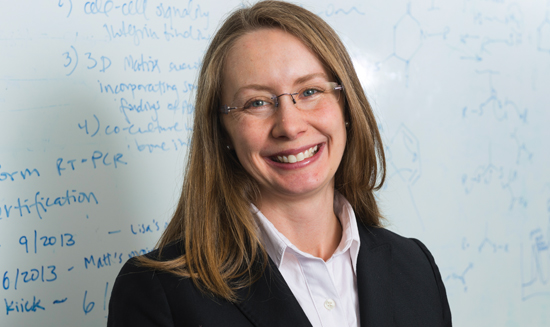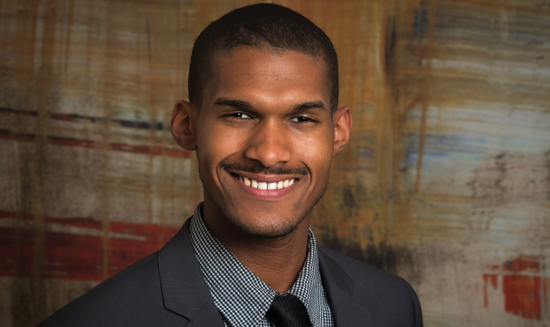



Join us in celebrating these recent winners of major national honors.

April Kloxin is an assistant professor of chemical and biomolecular engineering at UD.
What's the story behind April Kloxin's beaming smile? There are great reasons both professionally and personally, as you'll find out in the following Q & A.
This past spring, the assistant professor of chemical and biomolecular engineering won two of the most prestigious awards available to researchers in the early stages of their careers: a four-year, $500,000 National Science Foundation Faculty Early Career Development Award, which supports integrated research and education projects by outstanding teacher-scholars; and a Pew Scholar in the Biomedical Sciences award, for which she will receive $240,000 in research funding from the Pew Charitable Trusts.
A.I grew up in a small farming community in North Carolina called Germanton (population ca. 827 in 2010), outside of the city of Winston-Salem.
My mom and dad—we went to the public library a lot to attend science and nature demonstrations and to pick out books, some on designing science experiments to do at home as well as solving puzzles. Perhaps most importantly, my parents taught me to believe that I could become anything that I wanted career-wise as long as I was willing to work hard and apply myself.
My group is focused on understanding how changes in the physical and chemical ‘inputs' to human cells influence how our bodies heal or how disease progresses. In particular, some of the big questions we are excited about and on which currently we are working include—what are the key ‘inputs' at different times for (1) regenerating tissue interfaces, such as those between bone and ligament for enhanced ACL [anterior cruciate ligament] repair, (2) controlling cancer dormancy to prevent recurrence, and (3) regulating an inappropriate wound healing response in the lungs toward preventing tissue stiffening and loss of function?
First and foremost, I could not live without the students working with me, as well as our collaborators. The students are fantastic and drive me to be a better scientist, mentor and teacher, and I am very fortunate to have been the recipient of outstanding mentoring throughout my career. The instrument I could not live without is a microscope. It is critical for understanding how cells respond to our materials and, more generally, seeing is believing (when paired with other quantitative data).
Work hard, dream big, and do not give up. There is a lot to learn initially in science and engineering, which can be intimidating, but with this knowledge base, you truly can solve important problems and help others.
I enjoy the simple daily pleasures in life: cooking a meal with my family, going for a walk and having a nice glass of Scotch or red wine while watching Top Chef. Joyfully, I cannot do that last one these days though, as my husband and I currently are expecting our first child.

N'Kosi OatesN'Kosi Oates
For N'Kosi Oates, who begins his senior year at UD this fall, everything has come full circle.
Last summer, Oates—who is in the McNair Scholars Program—began researching potential schools where he could eventually pursue a doctoral degree. The double major in communication and political science came across a professor at Columbia University with whom he thought he'd like to work.
That instructor was Dorian T. Warren, associate professor in the Department of Political Science and the School of International and Public Affairs at Columbia.
In January, as Oates prepared to apply to the Leadership Alliance Summer Research Early Identification Program, he contacted Warren. The program provides undergrads interested in applying to doctoral programs with the opportunity to conduct research for 8–10 weeks with a mentor at one of 22 participating institutions.
"I wanted to see if he could serve as my research mentor as well as give me a glimpse of life in the profession," says Oates, who received an email back from Warren in less than five minutes.
I live in Neptune, N.J.
Columbia's research program is distinctive. In addition to having a faculty mentor, we were assigned graduate student mentors (GSMs). I met with my GSM three or four times a week, and she helped me with my research project. I went to the library at 10 or 11 a.m. and left when it closed at 8 p.m. The schedule would be slightly altered when we had mandatory workshops to attend.
New York is unlike anything I have ever experienced. Life unfolds in the city. I walk down one street, and there is one culture. I turn the corner, and I am immersed in another culture. I was intrigued and inspired by what I witnessed in New York.
My research concentrated on the relationship between neighborhood poverty and African American political participation in the context of the 2008 presidential election. I used political scientists Michael Dawson and Cathy Cohen's article in 1993 as my main resource for my theoretical framework. Using recent information and data, I challenged their theory.
Absolutely! Everyone that was integral to the program has influenced my trajectory. The graduate student mentors helped me conceptualize grad school life. My research mentor, Dr. Warren, was very helpful in sculpting my future. I met with him regularly, and in every encounter he elevated my intellectual consciousness as a scholar.
Every year, I raise the bar and try to maximize my experiences. There is no doubt that I will continue to have that mindset this year. However, my primary focus is on applying to Ph.D. programs and successfully defending my senior thesis. I'm not sure what the future holds, but I remain optimistic because I know I didn't come this far to fail.